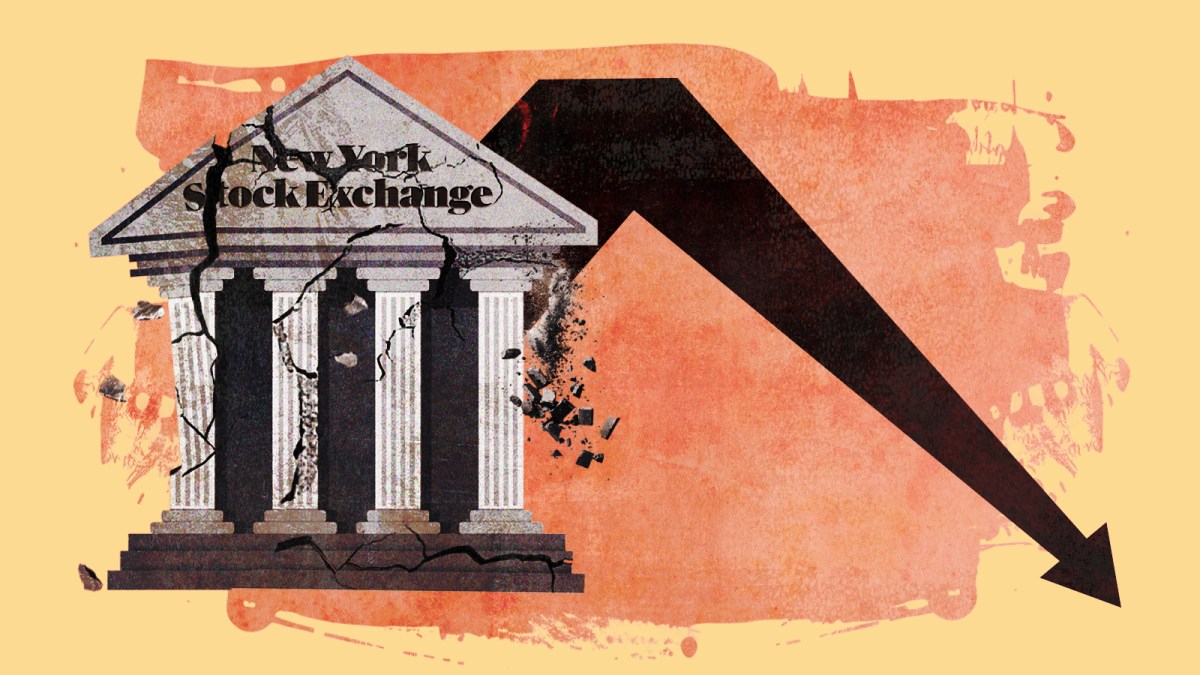Rich Handler has seen it all with financial meltdowns. One of the biggest characters on Wall Street, he has been boss of the investment bank Jefferies for 24 years. He took over during the dotcom crash, then endured the financial crisis and Covid.
Last year, Handler declared that he was “extremely bullish” about Jefferies, which he had joined in 1990 as a trader, as he sold $65 million worth of his shares to buy a 164ft yacht.
Last Sunday, though, he took the unusual step of penning a reassuring letter to the bank’s shareholders. Jefferies shares had collapsed by 20 per cent in just a fortnight after it incurred losses on a collapsed business called First Brands. With Brian Friedman, the bank’s president, Handler told shareholders that the losses to the Cleveland-based business were “readily absorbable”.
The letter signalled that what had first seemed like a local problem with a car-parts maker was threatening to become a global issue. Suddenly, investors were looking for unseen risks in the financial system, a fear heightened on Thursday when two regional lenders in America announced losses on loans. That spilled over into global stock markets, causing Barclays shares to slide by as much as 6 per cent on Friday as part of a £10 billion wipe-out of London-listed bank shares.
To some, it evoked memories of the run-up to the 2008 financial crisis, when markets were gripped with uncertainty about hidden risks in the banking sector. Neil Birrell, chief investment officer of the fund manager Premier Miton, said: “Back in 2008, it was, where are the time bombs, where are they ticking, what is going to blow?
“That is part [of what is going on]. You don’t actually know [where the risk is].”
Why are investors worried?
Since the financial crisis, there has been an explosion in what is known as the private credit market — the means by which companies are able to get loans without using conventional banks or issuing bonds to investors.
This non-bank lending, a type of “shadow banking”, was born because banks pulled back from lending as they tried to recover from the financial crisis.
However, the fund managers, pension funds and insurance companies that participate in this lending are not regulated in the same ways as banks, so the lending is harder to quantify — and find.
According to the data site PitchBook, the private credit market grew by $1 trillion between 2020 and 2025 to reach $3 trillion (£2.2 trillion), and will expand to $5 trillion by 2029. The Bank of England reckons that private credit fuelled nearly all of the £425 billion net increase in lending to British firms from 2008 to 2023.
• Comment: Wall Street is worried the private credit bubble will burst
The losses incurred by Jefferies were through both its conventional investment bank and its asset management division, which is involved in debt financing through a fund called Point Bonita Capital. That exposure raised fears about issues lurking in the private credit market, which the head of the International Monetary Fund, Kristalina Georgieva, admitted last week to keeping “me awake every so often at night”.

The investment bank is exposed to the private credit market through its Point Bonita Capital fund
GETTYNAH MOON/GETTY IMAGES
Where are the troubled loans coming from?
A US business called Tricolor, which sold used cars and granted loans, filed for bankruptcy in early September. Weeks later, First Brands collapsed. Both are subject to allegations of fraud, with First Brands receiving most of the scrutiny because of the low profile of its founder, Patrick James.
He had funded the business, which employed 26,000 people, through receiving credit on invoices — but the firm has admitted that $2 billion is unaccounted for. A spokesperson for James has reportedly said that he “always conducted himself ethically” and the firm had “experienced financial distress due to a perfect storm of tariffs, volatile interest rates and well-known industry headwinds”.
Last week, Jamie Dimon, the chief executive of JP Morgan, admitted that his bank had taken a $170 million hit on Tricolor and that he was on the lookout for further problems in the market. “My antenna goes up when things like that happen. I probably shouldn’t say this, but when you see one cockroach, there’s probably more. And everyone should be forewarned at this point,” he said.
Barely 48 hours later, the cockroaches were emerging from their dark corners. Two American regional banks — Zions and Western Alliance — reported losses on lending that they believed to be subject to fraud. Analysts at JP Morgan said that while these losses appeared to be contained and small, “this is an industry where investors — especially those that are new to this sector — tend to sell first and ask questions later”.

The American used-car business filed for bankruptcy in early September, with JP Morgan chief Jamie Dimon, below, admitting his bank had taken a $170 million hit on Tricolor
MARK FELIX/GETTY IMAGES

SHANNON STAPLETON/REUTERS
Hence the reaction of the markets on Friday, when the Vix — famously known as the “fear index” — jumped to levels it had last traded at in April when Donald Trump announced his “liberation day” tariffs. The Nikkei in Japan fell 1.6 per cent, the FTSE 100 lost almost 1 per cent and bank shares across Europe fell, including Deutsche Bank of Germany, which slumped by 6 per cent.
Is all private credit bad?
The losses that have started to emerge have raised fears that lending standards are too relaxed in the private credit market. New York-based Steven Chiavarone, deputy chief investment officer of equities at Federated Hermes, said: “A lot of the lower-quality lending has occurred with non-bank lenders … and standards around lending and fraud protection have not been as strong as they should be.
“Some of the regional banks are the recipient of this trouble, not the source of it,” he added.
But Chiavarone stressed this was different to 2008, when the lending that went sour was home loans for Americans that had been packaged up into complex financial instruments. This time, the problematic lending is to companies, which is more self-contained than the mortgage market and less likely to hurt consumer sentiment. He also stressed that the big banks had actually reported an improvement in bad debts.
Those who know the private credit markets well insist that it is unfair to suggest all the lending is bad. The British nuclear power station Hinkley Point C, for instance, is funded by £4.5 billion of loans from Apollo — a fund manager that specialises in private markets — to the French giant EDF, which is leading the project.

Hinkley Point C is funded by £4.5 billion of loans from a fund manager that specialises in private markets
EDF ENERGY/AFP
On its website, Apollo argues that rather than hide risk in the system, private credit markets help to diversify risk by providing alternative sources of financing for firms and helping to take jeopardy out of the banking system.
The Bank of England has also acknowledged that lending through private markets could lower the risk from a financial stability perspective. But it warned that companies borrowing through private credit markets are more likely to find the going tougher when interest rates rise.
What’s next for markets?
Even before the worries over credit losses, there had been concerns that stock markets were ripe for a fall after roaring to record highs this year, partly spurred by surging optimism about the rise of AI. Chiavarone said: “This is likely a tremor, not an earthquake, but it’s been enough to cause some volatility in the US markets and caused volatility globally.”
• IMF warns burst AI bubble could rival dotcom crash
Birrell at Premier Miton said the reaction to the losses by the American banks — which were almost “irrelevant” in terms of size — showed how “fragile” stock markets had become. “You’ve got to remember where we’ve come from and how strong markets have been,” he said.
Investors had all been piling into similar things: AI-related stocks and precious metals such as gold, which has been at record highs. “When you do get a bit of bad news, it doesn’t matter how bad it is, you see this reaction,” said Birrell.
For the rest of the year, “is there going to be a Christmas Santa rally or is Grinch going to take over?” he asked. “There’s almost an equal chance.”
By Friday evening, the major indices in America had all closed the week higher, helped by Trump’s decision to soften his stance from a week ago to impose “massive” new tariffs on Chinese goods. Meanwhile, trading updates from other regional banks did not cause alarm.
As for Handler, he ended the week with an “investor day” for his shareholders. He started by telling them he had worked for Jefferies for 36 years and that he and his 6,000 staff and joint venture partners owned 35 per cent of the company between them. “This is personal. We care and we own this company with you. And everything we do is beyond money. It’s personal.”
His words helped to arrest the decline in the bank’s shares. He will be hoping the storm has passed.

